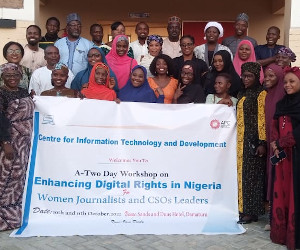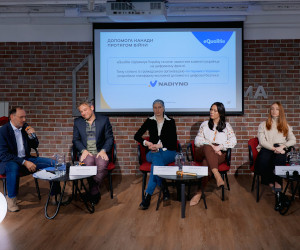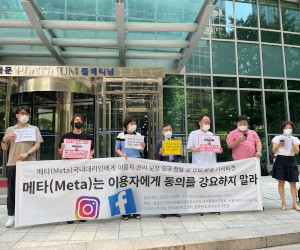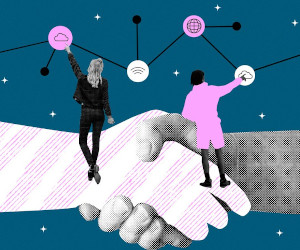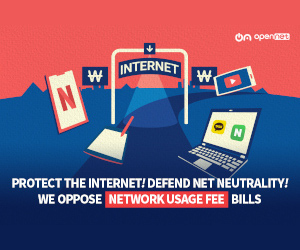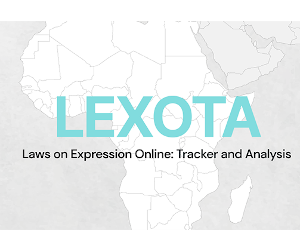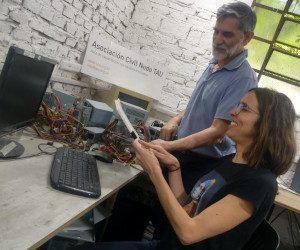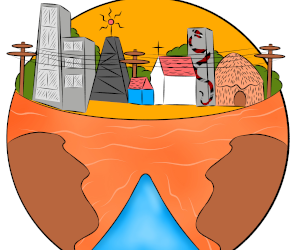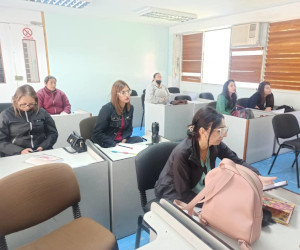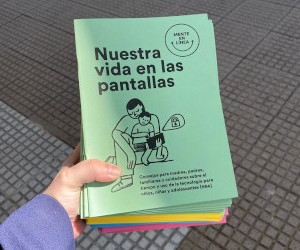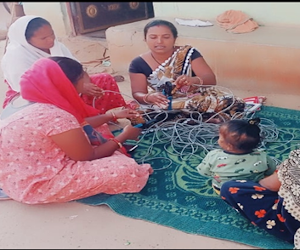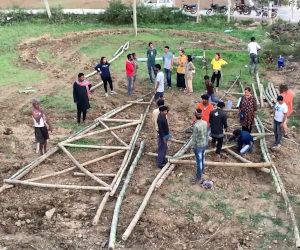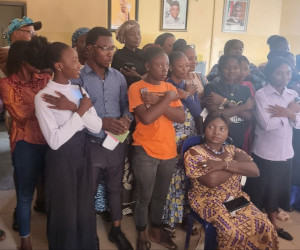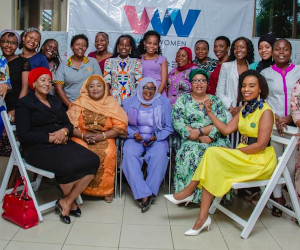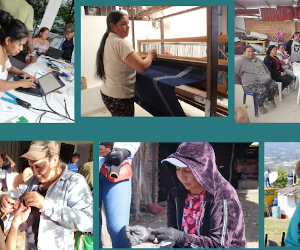-
CITAD trained women journalists and civil society
leaders on digital rights in Nigeria
As part of its Enhancing Digital Rights in Nigeria
Project, on 10 and 11 October, 2022, the Centre for
Information Technology and Development (CITAD) organised a two-day capacity building workshop for
women journalists and leaders of civil society
organisations in northern Nigeria. The workshop in
Damaturu, Yobe State, drew 31 participants (27 women
and 4 men) from eight states.
Ten presentations were made, including on privacy as
special digital rights, the
African Declaration on Internet Rights and
Freedoms,
Feminist Principles of the Internet, state derogation of digital rights, gender violence
as digital rights abuse, policies and laws that have
implications on digital rights in Nigeria, and the
legal perspective on digital rights. The workshop
trained participants in issues related to digital
rights and produced Digital Rights Champions to join
the campaign for digital rights in the country. These
champions also passed on this training to 449 other
individuals in their states.
Image: Women journalists and civil society leaders
at CITAD’s digital rights workshop.
Image source: CITAD.
-
eQualitie supported Ukrainian people and media
organisations to stay safe online and circumvent
internet censorship
Since the beginning of the Russian invasion of Ukraine
in February 2022,
eQualitie
launched a series of
rapid efforts focusing on digital security capacity
building
of Ukrainian citizens, media agencies, human rights
organisations and civil society organisations.
eQualitie launched Ukraine’s first national digital
security helpline
Nadiyno.org
in partnership with Internews Ukraine in November.
Nadiyno responds with immediate and easy solutions to
questions about cybersecurity and communication
safety. As of December 2022, more than 1,100 users
were running their own Mastodon instances
(communities) on this platform to communicate with
each other and millions of other users from hundreds
of federated Mastodon instances worldwide.
eQualitie has also run digital security webinars that
have so far reached 1,027 participants. In partnership
with the Ministry of Digital Transformation of
Ukraine, DEP, and the Association of Right Owners and
Providers of Content, eQualitie supplied 29 Ukrainian
ISPs with 172 SBL 135-12HR batteries to power the
providers’ fibre optic network during power outages.
eQualitie also protects the websites of over a hundred
Ukrainian media and human rights organisations
(including of the 2022 Nobel prize laureate, the
Center for Civil Liberties) from daily DDoS attacks. Since the beginning of the
conflict, an additional 60 Ukrainian websites have
been onboarded, bringing a daily audience of over half
a million people in Ukraine. Through eQualitie's
Censorship.no
(Ceno) project, users in temporarily occupied
territories are able to circumvent internet censorship
where website blocking and traffic surveillance are
rife. Using the Ceno browser, more than 20,000
Ukrainian users can circumvent local network filtering
and share contents of retrieved web pages with each
other.
Image: At the launch of eQualitie’s digital
security helpline Nadiyno.org, with partner
Internews and the Ministry of Digital Transformation
in November 2022.
Image source: eQualitie.
-
Jinbonet won a legal battle against Big Tech
monopolies and personal data infringement in Korea
In 2021, Korean Progressive Network
Jinbonet
began its work against big tech monopolies and
infringements of personal data, filing a lawsuit for
damages over Facebook's privacy violations, the
so-called Cambridge Analytica scandal. In 2022, Meta
tried to force users to agree to the revision of its
privacy policy and was met with a strong backlash.
Meta was widely understood to be collecting vast
amounts of users’ personal behavioural data without
their knowledge for the purpose of targeted
advertising. Civil society organisations, including
Jinbonet, conducted a campaign against Meta, with a
series of actions including a press conference in
front of the Meta office. With the support of APC's
research and campaign grant, Jinbonet conducted a
campaign against Big Tech including
a forum at South Korea’s National Assembly
to criticise the illegal collection of personal data
for targeted advertising, and other issues arising
from Big Tech monopolies.
In September 2022, South Korea’s data privacy
watchdog, the Personal Information Protection
Commission, imposed a fine of approximately 100
billion won (USD 72 million) on Google and Meta for
collecting and using third-party behavioural
information without consent. It also issued a
corrective order and formed a task force to establish
guidelines for the processing of personal data for
targeted advertising purposes.
Image: On 28 July 2022, Jinbonet and other civil
society activists held a press conference in front
of the Meta office to protest Meta's privacy
policy.
Image source: Jinbonet.
-
Derechos Digitales collaborated for Latin American
advocacy on digital rights
APC's relationship with
Derechos Digitales
represents a history of collaboration for human rights
in digital environments. In 2022, Derechos Digitales
worked with APC
to identify the many ways in which internet access was
restricted through shutdowns in regions of the global
South, from which they systematised learnings and
challenges that they presented at the 50th session of
the United Nations Human Rights Council. Derechos
Digitales also partnered with APC and other APC
members to document the digital rights situation in
Brazil
and
Ecuador
in the framework of the United Nations Universal
Periodic Review process. They ran a campaign to
influence the recommendations issued to these nations
with perspectives on digital rights. These coordinated
efforts made it possible to position a responsible
view of human rights, which encourages working with
other representatives of civil society to advance as a
region.
This intention also materialised in the deployment of
an observation mission on the occasion of the
imprisonment and subsequent acquittal of the Swedish
system developer
Ola Bini, arrested in 2019 and
declared innocent three years and nine months later
by the Ecuadorian justice system. This ruling was celebrated as an advance for the
protection of people working in digital security in
Ecuador that also set a precedent in the region,
taking into account the growing and illegitimate
persecution of digital security experts.
Image: Illustration for the article “Mujeres
haciendo tecnología” by Derechos Digitales.
Image source: Lucía Boiani for Derechos Digitales.
-
Open Net Korea successfully defended net neutrality
and opposed the “network usage fee” bill
Since 2020, the Korean legislature has been trying to
deliberate on a “network usage fee” bill that
contradicts the international human rights standard of
network neutrality. South Korea has already
implemented the “sender pays” rule since 2016, which
imposed data toll charges on content providers. As a
result, content providers hosting popular content had
to pay telecommunication providers in proportion to
that popularity. Seoul’s internet access fee has
become higher than other parts of the world. Many
startups and content providers have since left Korea
because of these raised fees. If the Korean
legislature passes the new “network usage fee” bill,
then content providers will be legally obliged to pay
the data toll charges, taking them back to the days of
charging toll on data like telephony and reversing the
advances made through the internet.
In 2022,
Open Net Korea
successfully defended net neutrality and opposed the
“network usage fee” bill. Open Net Korea campaigned
against the bill and attended a public hearing hosted
by the Korean legislature. Close to 300,000 people
took part in Open Net’s petition drive. Today, the
“network usage fee” bill is on hold.
Image: The poster for Open Net’s petition drive to
oppose the network usage fee bill.
Image source: Open Net Korea.
-
PROTEGE QV released an interactive map of legal
responses to disinformation in sub-Saharan Africa
With the support of Global Partners Digital,
PROTEGE-QV, alongside other consortium partners including
ARTICLE 19, CIPESA and the Centre for Human Rights at
the University of Pretoria, are currently conducting a
project titled “Promoting Rights-Respecting Approaches
to Tackling Disinformation”. The goal of the project
is to bring about human rights-friendly laws online
through the development of both a capacity building
training plan and a national advocacy strategy. So
far, the project has yielded a prominent outcome with
the release of
LEXOTA
(Laws on Expression Online Tracker and Analysis), an
interactive map that highlights the legal and
regulatory responses that states in sub-Saharan Africa
are deploying to combat the phenomenon of
disinformation.
Online disinformation has become a major global
concern, and so has the legislation designed to tackle
it. Cameroon is no exception when it comes to laws
that contain provisions restricting the enjoyment of
online freedoms – whether directly aimed at the
digital environment or not. Therefore, how can
Cameroon craft responses to disinformation that
respect the right to freedom of expression? PROTEGE QV
explored ways to improve the situation, from
respecting international commitments to taking into
account international human rights standards when
formulating laws on online freedom of expression.
Image: LEXOTA logo.
Image source: PROTEGE QV.
-
Pangea published guides for ethical technologies in
Spain
Pangea
promotes ethical technologies and their socially and
environmentally responsible use. In 2022, Pangea
carried out a new chapter of these environmental
advocacy actions by publishing four new guides and
graphic materials specially focused on email services.
With support from a 2022 APC research and campaign
subgrant, they developed, published and disseminated
four new educational and practical materials on
critical decisions in the consumption and use of
information and communications technologies. The
materials
are available in Spanish and Catalan and include two
guides on
email
use, one on
phishing
and one on
URLs shortener services. These guides expand the work started in previous
projects (in collaboration with APC) to better explain
and expand critical choices, practices and concepts
related to internet services. Also in 2022, in
collaboration with
eXO
(Expansió de la Xarxa Oberta), they offered their
members a test of the
BBB
(Big Blue Button) service, an open source web
conferencing solution for online learning, using
Pangea's Nextcloud and eXO BBB server to evaluate
interest in a possible new service.
Image: An icon from Pangea’s guide on
phishing.
Image source: Pangea.
-
Nodo TAU in Argentina joined hands with APC members in
Argentina, Colombia, Costa Rica and Spain to share
projects and learnings
During 2022,
Nodo TAU
had the joy of sharing several projects with members
of the APC network. They joined the ANERA project with
AlterMundi for the promotion of community networks in
Argentina. They started a conversation with Colnodo in
Colombia and Sulá Batsú in Costa Rica to work together
on gender-related issues.
In 2022, Mireia Roura, a member of eReuse and Pangea,
visited Nodo TAU’s Electronic Waste Management Plant.
Nodo TAU started the plant in 2019 with three
objectives: to provide a sustainable solution to
e-waste, promote digital inclusion by recovering
equipment for community use, and create a work space
for young people. Roura visited the organisation to
learn about the experience of the plant and to share
knowledge with the work team. Together they reviewed
the operating systems and registration tools at the
plant and the traceability system that Nodo TAU uses,
which was developed by eReuse. During her visit, Roura
also offered training to the members of the plant
team, who were developing a training process towards
creating a work cooperative run by young people. With
Roura, Nodo TAU also revisited experiences of the
Digital Communities project, a programme that brings
together the municipal government, tech companies and
Nodo TAU to equip spaces for community access to
technology. There, Roura was able to learn about the
programme and also collected data for her research on
measuring the environmental impact of reusing
equipment.
Image: Mireia Roura from Pangea with Eduardo
Rodríguez from Nodo TAU during the visit.
Image source: Nodo TAU.
-
Intervozes ran a successful campaign against
misinformation about the Amazon
Amazônia Livre de Fakes is a project by
Intervozes
that aimed to combat misinformation and hate speech in
the Amazon region, based on a survey of 200 web pages
and profiles that propagate misleading content and
through strategic campaigns to confront this digital
environment. The project was run by a working group
formed by Intervozes and eight other Amazonian
organisations, including Indigenous people,
quilombolas, young people, women, researchers and
community members from the countryside, the rainforest
and the city.
With further information, the group arrived at a list
of 70 content producers operating in the states of
Pará, Amapá, Amazonas Mato Grosso, Roraima, Tocantins
and Acre. These were segmented into three large groups
of producers and disseminators: right-wing social
movements, channels/journalistic companies, and
representative public figures (legislators or
candidates in the 2022 elections). Since their initial
strategy to combat disinformation was a campaign to
demonetise pages that propagate disinformation, they
decided to delve deeper into journalistic channels
based on two criteria: visibility and self-designation
of doing journalism. Therefore, they arrived at three
pages: Portal Novo Norte, Vista Pátria and Terra
Brasil Notícias, with millions in traffic and shares
by other pages and profiles of Amazonian territories.
As a result of their campaigns, they had a
disinformation propagator withdraw from the
candidacy for the senate, brought about a change in Google's attitude by
providing more information about candidates, and
fostered a debate in society about ways to finance
disinformation.
Image: The logo of the Amazônia Livre de Fakes
campaign was created by an Amazonian
designer.
Image source: Gil Reis.
-
May First raised awareness about the critical role of
community journalism and autonomous technology in
Mexico
In April 2022,
May First Movement Technology
launched its first Engagement and Communications team,
recruiting folks directly from its membership to help
spread awareness of the critical role that autonomous
technology plays in the movement for liberation. It
got off to a fast start – organising several sessions
at the
World Social Forum
in Mexico City in May. This was followed up with a
webinar,
Get the Tech Off My Body, highlighting the technology implications of the US
court ruling overturning Roe v. Wade in the United
States Supreme Court and the links between technology
and reproductive justice.
Over the summer, May First collaborated with its
member
La Coperacha
(Mexico City) to present a session on community
journalism at the Allied Media Conference. The
organisation interviewed over a dozen members to write
a paper on the reasons movement organisations value
autonomous technology and how they understand its role
in their strategies for change. In September, May
First joined a coalition of US-based movement
organisations called "Rising Majority" for a multi-day
strategy session to build a shared agenda for
liberation. In November they partnered with their
member Media Justice to organise "Turning Up the Heat
on Big Tech", where they pulled together activists
organising Amazon warehouse workers, fighting
local/police surveillance (e.g. Amazon Ring), and
targeting big tech military contracts with the Israeli
military.
Image: May First logo.
Image source: May First.
-
EsLaRed developed a platform to train teachers in open
technologies in Mérida, Venezuela
It was clear that in 2022, Venezuela urgently needed
to set up technological infrastructure for remote
education and to establish the foundations of a system
adapted to the new educational realities. During the
COVID-19 pandemic and after it as well, the country
experienced a sharp need for access to innovative
technological platforms that facilitate online
learning, the management of open educational
resources, collaborative work, intelligent interaction
with students, and access to knowledge repositories,
among many other resources.
Educational centres in Mérida, Venezuela have suffered
a great lack of participation of teachers and students
to comply with the training plans provided by the
Ministry of Education and, in addition, there were
great needs in the management of technological
resources. As a response,
EsLaRed
implemented campaigns, programmes and training plans
in digital technologies in Mérida. EsLaRed developed
(with funds approved by APC) its project CATAE, which
stands for Training in Open Technologies for
Education. EsLaRed is currently training its first
pilot group of 20 educators selected by the Centre for
Teacher Research and Training (Educational Zone) in
the Libertador Municipality of Mérida State, in
Venezuela, which should become the first link in a
continuous chain of training of trainers. In this way,
teachers and students will have the knowledge that
will allow them to carry out remote educational
processes in an emergency in a more efficient way.
Image: Group of educators engaging in a training
from EsLaRed.
Image source: EsLaRed.
-
TEDIC promoted reflective online practices that
contributed to better mental health in Paraguay
The pandemic has meant a radical and abrupt change in
human lives: changes in daily life, in the ways we
work and study, and above all, in the ways we
socialise. In the face of the need for “social
distancing”, everyone found themselves looking for
other means of connection with others. This meant
spending more time isolated and more time in digital
spaces. Since excessive use of technology is related
to an increase in behaviours and emotions related to
anxiety, depression, stress and other psychosocial
risks, it is important to have practices that
contribute to an agile and reflective use of
technology that contributes to our mental health. That
is why
TEDIC
created the
Mente en Línea
website, the Mental Health on the Internet campaign
where they share resources in the form of
podcast episodes, illustrated fanzines that can be obtained both
digitally or in print, and articles and research to
delve deeper into the different factors that impact
our behaviour and mental health when interacting with
technologies.
In 2022, they developed a new fanzine focused on
people who care for children and adolescents with the
goal of accompanying and rethinking their use of
technology at a key age for their development. "Our Life on Screens" touches on topics such as the suggested screen use
time for children and adolescents and the
differentiation between healthy and unhealthy habits
in front of screens, among other things. They
e-delivered more than a thousand copies of this
fanzine to different institutions including the
Ministry of Public Health, Enfoque Niñez NGO, UNICEF
and Centro de Desarrollo para la Inteligencia.
Image: TEDIC distributes copies of their fanzine Our
Life on Screens.
Image source: TEDIC.
-
Open Culture Foundation promoted open source
technology in Taiwan with a board game
Through promoting open technology and cross-field
collaboration,
Open Culture Foundation
continues to connect tech communities and public and
private entities in Taiwan. By doing so, they promote
open co-creation and protect digital human rights,
thereby supporting a more transparent and inclusive
digital civil society. In 2022, OCF launched “Open
Source Star Village“, a board game designed for
newbies who don’t know how to use or collaborate with
open source technologies. The board game was designed
in traditional Chinese and is Creative Commons
licensed and free and open for everyone to download,
print and remake in other languages.
2022 was also the year in which OCF collaborated with
the US-based think tank New America Foundation on
their international evaluation tool
Ranking Digital Rights, designed to measure the extent to which
corporations in various countries are protecting
digital human rights during their operation and
service provision to consumers. By collecting and
releasing quantitative data on corporations' digital
human rights practices, OCF hopes everyone can better
understand the current status of digital rights
protections by corporations and use this information
to inform policy decisions and increase accountability
across the digital landscape.
Image: Open Source Star Village, the board game
designed by Open Culture Foundation.
Image source: Open Culture Foundation.
-
ALIN brought the power of online learning to offline
school environments in Kenya
In 2022,
Arid Lands Information Network
(ALIN) with support from APC implemented their
“Bringing the power of online learning to offline
environments” project. The project piloted the Remote
Area Community Hotspot for Education and Learning (RACHEL) in five schools at Ng'arua Maarifa Centre, ALIN's
ICT hub. RACHEL is a portable plug-and-play server
with a five-hour battery life. A free offline digital
library, RACHEL stores educational websites and makes
content available over any local (offline) wireless
connection.
Through this project, ALIN built the capacity of 86
teachers and facilitators to incorporate RACHEL
technology and content into their classrooms. They
were able to create, access, reuse, repurpose, adapt
and redistribute digital content to learners. A total
of 1,521 students learned how to access educational
content via RACHEL.
RACHEL enables the schools to share quality education
materials widely, challenges teachers to incorporate
digital technology into their classes and helps
learners access quality content autonomously.
As an open educational resource (OER), RACHEL has a
central role to play in Education 2030 in the
framework of Sustainable Development Goal (SDG) 4,
which calls for the international community to “Ensure
inclusive and equitable quality education and promote
lifelong learning opportunities for all” with its key
pillars of access, equity and inclusion.
Image: ALIN Director Mr James Nguo handing over the
RACHEL equipment to the teachers.
Image source:ALIN.
-
Jokkolabs Banjul empowered marginalised Gambian youth
with knowledge of digital rights and skills
Through its Youth and Digital Inclusion Project with
APC,
Jokkolabs
has launched initiatives to help empower Gambian
youth. Through its Digital Human Rights Workshops,
Jokkolabs was able to provide resources and guidance
to youth on how to use technology safely, identify and
protect their digital rights, and develop basic
digital literacy skills. The organisation also
established a safe space for youth to discuss digital
rights issues, fostering collaboration among different
youth groups.
Jokkolabs also trained over 600 young people from
vulnerable and marginalised communities in digital
literacy skills, such as using computers and the
internet, digital marketing, and simple data analysis.
Jokkolabs organised students to build a database of
public goods and services, using information collected
by recent high school graduates and tertiary
institution students. The database will help students
understand the use of public services, develop
policies, address disparities in access, and inform
education initiatives to build trust and increase
public participation in policy-making processes. These
initiatives have fostered digital skills and human
rights knowledge, supported digital inclusion for
vulnerable individuals, and encouraged governance of
the internet as a global public good, aiming to help
create a just society where all young people can
access essential digital tools and knowledge.
Image: Young men and women in a Jokkolabs digital
literacy workshop in the Lower River region of
Gambia.
Image source: Jokkolabs Banjul.
-
KICTANet advocated for people with disabilities to
engage in ICT policies in Kenya
Digital access, digital accessibility and women's
rights are at the core of
KICTANet’s work. The passion for improving access to
information is evident in the village of Mtondia,
Kilifi County, home to the Dunia Moja Community
Network, which was bootstrapped by KICTANet. As a 2021
local access network grantee,
Dunia Moja
connected 15 schools in Kilifi with an average of
1,000 students each. One interesting beneficiary is
the Kibarani School for the Deaf. In a silent world,
the students perceive and conceptualise things better
visually. Internet access provides them an equal
opportunity to experience the world.
In 2022, through the ICT Access and Equality for
Persons with Disability Programme, an initiative was
born to address the digital divide between
non-disabled and persons with disabilities in Kenya.
Two fellows were onboarded to create content around
accessibility issues for persons with disabilities.
During the 2022 global IGF, the fellows highlighted
various ICT issues around disability and digital
access. The programme has fostered networking and
potential partnerships with disability rights
organisations and provided a national and
international platform for people with disabilities to
actively engage and contribute to ICT policies and
conversations affecting them directly.
Under the
Our Voices, Our Futures
programme, a Feminist Tech Exchange on digital
storytelling brought together women who had been
candidates in the 2022 general elections in Kenya.
They were trained on how to blog and record podcasts
by seasoned content creators. Today they are active on
digital platforms telling their stories on community
development.
Image: A classroom at the Kibarani School for the
Deaf, run by the Dunia Moja Community Network.
Image source: KICTANet.
-
Digital Empowerment Foundation helped rural women
engineers to connect the unconnected in India
Beyond certified degrees, true engineering lies in
real-time problem-solving skills with a good
understanding of the underlying technology.
Digital Empowerment Foundation
(DEF) has been training women to connect the
unconnected and Nisha Kumari is one of DEF’s Wireless
Women Engineers. Nisha is an unexpected sight in rural
India. Nisha is a member of an agricultural household
in the village of Bartoli, in Jharkhand in central
India. Keen to learn how to use a computer, she joined
DEF’s wireless training programme to learn how
wireless connectivity works and how it can help the
community. Once she attended the training, she started
using a wireless network. She has since been
enthusiastic about learning more wireless technology
and introduced it in her village so that her community
members could stay connected. She has also been
encouraging everyone in her village to get trained as
well. Nisha is now set upon establishing her own
wireless centre and providing better network and other
digital services to members of her community.
Image: Nisha Kumari, trained by DEF in wireless
networks, introduces the concept to women in a
village in central India.
Image source: Digital Empowerment Foundation.
-
Nupef implemented 18 new community networks in Brazil
In 2022,
Nupef
implemented 18 new community networks within
Indigenous lands and traditional communities in
Brazil. As one of Nupef’s leading projects, community
networks are part of a strategy to 1) reaffirm that
everyone has the right and should have the means to
access the internet, information and services, as well
as to communicate; 2) contribute to the protection and
preservation of the land, territories and environment
by Indigenous people, quilombolas and babassu coconut
breakers; and 3) help develop local knowledge around
the use of ICTs. Establishing 18 community networks
was a record, the highest number implemented by Nupef
in one year.
In 2020 and 2021, Nupef’s capacity to implement
infrastructure in these territories was seriously
affected due to the pandemic. Even so, they managed to
implement a few when restrictions were less severe.
They also continued mapping the needs and planning
future actions in the territories with their partners
Movimento Interestadual das Quebradeiras de Coco
Babaçu, Instituto Sociedade, População e Natureza and
Coordenação Nacional de Articulação de Quilombos. The
isolation imposed by COVID-19 triggered and sped up
the development of online public services and made the
inequalities and digital gaps clearer than ever.
Meaningful access, with minimum quality and price
standards, is what is needed for equal access to
services and education.
Image: Nupef Community Networks team runs an
introductory session on community networks in
Quilombo Matões dos Moreira (Maranhão).
Image source: Nupef.
-
Servelots organised an annual hackathon in India that
initiated a collaborative project with community
networks around the world
Anthillhacks.in
is an annual event in Karnataka’s Community-Owned
Wireless Mesh (COWMesh) region organised by
Servelots
in a rural village near Bangalore. It is an annual
hackathon where experiences and skills are shared and
networks built and tested. In 2022, it brought
together many people who aspire to a decentralised
internet and independent community networks with
meaningful access and many local services. This also
initiated the LokaLR project: loka is world, lokaL for
local, LR for
LibreRouter, and R for router, so it is loka LR, alias lokal R.
The LokaLR project aims to foster collaboration
between technical teams supporting community networks
around the world by building on the closely related
ongoing technical work of APC members and partners.
Engineers from Servelots, Coolab, Wakoma, IIT,
Freifunk and SLS working in the design and
implementation of “minimum-viability” offline off-grid
wireless networks and information servers took
advantage of the two-week-long Anthillhacks event. The
prototype off-grid network will build on the work
Servelots has been executing with support from ISIF to
develop a do-it-yourself kit, which aims to allow
someone with no internet access to set up a wireless
access point with their own COWMesh local access
information and communications server.
Image: Community members setting up a bamboo tower
for a COWMesh node.
Image source:
COWMesh Anthillhacks.
-
Fantsuam Foundation trained Nigerian women survivors
of sectarian violence in ICT entrepreneurship
In southern Kaduna, sectarian killings have persisted
for years and women continue to bear the brunt of the
savagery. There has been no let-up and the situation
often seems beyond the capabilities of the security
agencies. In the thick of murders and sexual violence,
women survivors have been left with severe trauma
which they have to bear as they pick up what is left
of their lives. The survivors have had to nurse the
wounded, look after older members of the community, as
well as attempt to restart their small-scale
businesses and smallholder farms.
Fantsuam Foundation
hosts the offices of the Southern Kaduna Women Peace
Network (SKWPN) that ensures that women’s voices are
heard above the din of war in our communities. Amidst
the violence, Fantsuam was able to organise ICT
entrepreneurship training for some women survivors
with the hope that digital literacy skills will
eventually help with their emotional and economic
recovery. These training sessions are not merely for
skills and knowledge. They also serve to reassure the
women that their resilience is recognised and saluted.
Image: A group of women and men at an ICT
entrepreneurship training session organised by
Fantsuam Foundation.
Image source: Fantsuam Foundation.
-
Pollicy built a digital resilience programme for
African women political leaders in Uganda, Tanzania
and Senegal
Women political leaders should be equipped with
digital skills to handle the increasing demands of the
internet as they are a highly targeted group due to
their role in society. Moreover, they are at high risk
of experiencing gender-based violence online, which
can hinder their political and leadership progress.
Pollicy’s
Amplified Abuse
report demonstrates this, as they found that women
political leaders experience online abuse at a rate of
27% compared to their male counterparts who experience
abuse at 18%. They also found similar findings on the
extent of online gender-based violence through their
cross-sectional study in Kenya, Nigeria, South Africa
and Uganda. The study interviewed 3,306 women, with
about 23% of the interviewees acknowledging they had
experienced some form of online abuse as they interact
with the internet.
All these findings influenced Pollicy to design the
VOTE: Women programme, which is a leadership springboard for women
political leaders to build their digital resilience
while aspiring to political careers online and
offline. The implementation of the programme employed
a mixed approach of co-creation, gauging interests,
establishing advisory boards, expert consultations,
and interviews with women political leaders themselves
on their uptake of digital resilience. They were able
to design an open-source curriculum that equipped 40
women political leaders from the council levels in
Uganda and Tanzania with key digital skills, including
digital safety, creative writing, engaging with
different audiences and digital advocacy. The VOTE:
Women programme is now expanding its implementation to
Senegal, where Pollicy hopes to learn more experiences
of women political leaders in West Africa. For the
next two years, the VOTE: Women programme will also
focus on advocating for strengthened regulatory
frameworks across Africa that promote a safe internet
for women political leaders.
Image: Women political leaders at Pollicy’s VOTE:
Women inception meeting.
Image source: Pollicy.
-
Colnodo enabled rural women in Colombia to participate
in the digital transformation of their communities
Colnodo created initiatives to enable women living in
rural Colombia to participate in the design,
construction, management and sustainability of
community networks. The appropriation and use of ICTs
is contributing to the empowerment of women and the
reduction of the gender digital divide in the country.
Red Weiniun Walapuin, Red Poliniza, Red Ovejas Verdes,
Red Verbenal Renace, Red San Isidro del Oasis, Red
Consejo Comunitario de Zacarías and Red Páramo del
Almorzadero are community networks in rural areas of
Colombia that are being managed in collaboration with
Colnodo. In these networks, women of all ages
strengthen their capacities for community leadership.
These initiatives are giving women and girls the
opportunity to creatively and productively use ICTs to
generate content from their voices and experiences,
document situations of discrimination and violence, as
well as find educational and social opportunities.
ICTs are making it possible for women entrepreneurs to
market their products on fair and equitable terms.
Colnodo continues to promote the active participation
of women in the design, creation and governance of
technology for social development.
Image: Collage of pictures depicting local women
performing different activities.
Image source: Redes Comunitarias Colnodo.
